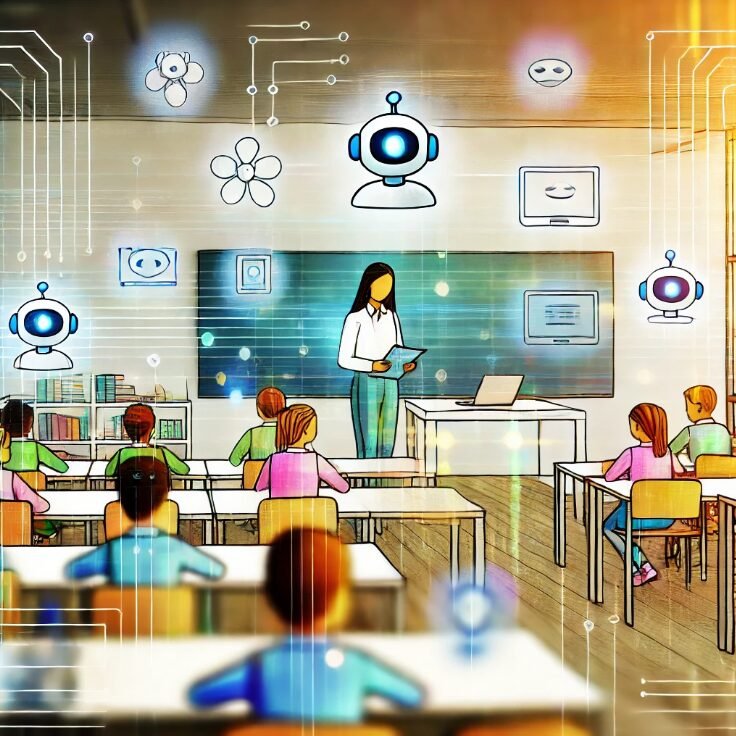In recent years, Artificial Intelligence (AI) has emerged as a transformative force across various industries, and education is no exception. The integration of AI technologies into classrooms is revolutionizing the way students learn and educators teach, paving the way for a more personalized, efficient, and engaging educational experience. This blog explores how AI is reshaping the classroom and what the future of learning might look like with continued advancements in this field.
Case Studies in Education: A Comprehensive Overview
Personalized Learning Experiences
One of the most significant impacts of AI in education is the ability to provide personalized learning experiences tailored to individual student needs. Traditional teaching methods often follow a one-size-fits-all approach, which can leave some students behind while others become disengaged. AI-driven educational platforms analyze students’ learning patterns, strengths, and weaknesses to create customized learning paths.
Adaptive Learning Systems leverage AI algorithms to adjust the difficulty and pace of lessons based on real-time student performance. For instance, if a student struggles with a particular concept, the system can provide additional resources and exercises to reinforce understanding. Conversely, it can accelerate learning for students who grasp concepts quickly, ensuring that all learners are appropriately challenged and supported.
Enhanced Engagement and Motivation
AI technologies are also enhancing student engagement by making learning more interactive and enjoyable. Intelligent Tutoring Systems (ITS) simulate one-on-one tutoring by providing immediate feedback and guidance, which helps keep students motivated and focused. These systems use natural language processing to understand and respond to student queries, creating a more conversational and engaging learning environment.
Additionally, gamification elements powered by AI, such as educational games and interactive simulations, make learning fun and immersive. By incorporating rewards, levels, and challenges, AI-driven gamified learning experiences can increase student motivation and foster a deeper interest in the subject matter.
Efficient Administrative Tasks
For educators, AI is streamlining administrative tasks, allowing them to focus more on teaching and student interaction. Automated grading systems can assess multiple-choice tests and even essay-based assignments with increasing accuracy, providing quick feedback to students and reducing the workload for teachers.
AI also assists in curriculum development by analyzing vast amounts of educational data to identify the most effective teaching materials and strategies. Educators can use these insights to design more effective lesson plans and adapt their teaching methods to meet the evolving needs of their students.
Improved Accessibility and Inclusion
AI technologies are playing a crucial role in making education more accessible and inclusive. Language translation tools powered by AI break down language barriers by translating educational materials into multiple languages in real-time, enabling students from diverse linguistic backgrounds to access quality education.
For students with disabilities, AI offers innovative solutions such as speech recognition and text-to-speech applications, which assist those with visual or hearing impairments. AI-driven tools can also convert written text into braille or provide real-time captions during lectures, ensuring that all students have equal opportunities to learn and participate fully in classroom activities.
Data-Driven Insights and Decision Making
The integration of AI in education facilitates the collection and analysis of extensive data on student performance and engagement. Educators and administrators can use these data-driven insights to identify trends, predict student outcomes, and make informed decisions about instructional strategies and resource allocation.
Predictive analytics can help identify students at risk of falling behind or dropping out, allowing for timely interventions and support. Moreover, continuous monitoring and analysis enable schools to measure the effectiveness of educational programs and make necessary adjustments to improve overall learning outcomes.
Preparing Students for the Future
As AI continues to permeate various aspects of society, equipping students with the skills to navigate and leverage these technologies becomes increasingly important. Integrating AI into the classroom not only enhances current learning experiences but also prepares students for future careers in a technology-driven world.
Educational programs that include AI literacy and coding enable students to understand and interact with advanced technologies confidently. This proactive approach ensures that the next generation is well-prepared to contribute to and thrive in an increasingly digital and automated global economy.
Challenges and Considerations
While the benefits of AI in education are substantial, it’s essential to address potential challenges and ethical considerations. Concerns about data privacy, the digital divide, and the potential for over-reliance on technology must be carefully managed. Ensuring equitable access to AI technologies and maintaining the human element in education are critical factors in successfully integrating AI into learning environments.
Conclusion
Artificial Intelligence is undoubtedly transforming the landscape of education, offering unprecedented opportunities to enhance teaching and learning experiences. By embracing AI technologies thoughtfully and responsibly, educators can create dynamic, inclusive, and effective classrooms that cater to the diverse needs of all students. As we look to the future, the continued integration of AI promises to redefine education, fostering a generation of learners equipped with the skills and knowledge to excel in an ever-evolving world.
Visit The Case HQ for 95+ courses
Read More:
Compact Case Studies: The Bite-Sized Learning Revolution
Utilizing Published Sources in Case Study Research: Advantages and Pitfalls
Leveraging Case Studies for Business Strategy Development
Inspiring Innovation Through Case Studies: A Deep Dive
The Art and Science of Writing Effective Case Studies
Exploring the Role of Case Studies in Market Research
Case Studies in Education: A Comprehensive Overview
The Emergence of Case Studies in Behavioral Sciences
Influencing Change: Case Studies in Nonprofit Organizations
Case Studies: Paving the Way for Inclusive Education



Responses